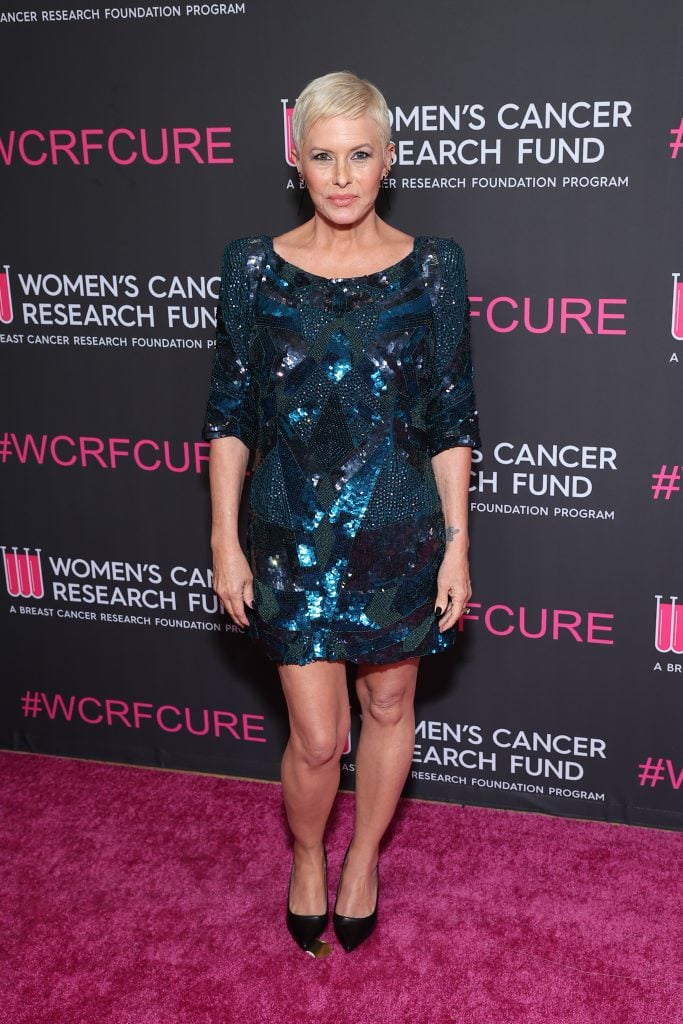Navigating Your Mental Health Journey Alongside Your Cancer Journey
- “Baywatch” star Nicole Eggert, 53, says talking openly about her diagnosis is her way of combating the mental health challenges her breast cancer brings.
- Eggert was diagnosed with stage 2 breast cancer after she discovered a lump while giving herself a breast self-exam—a crucial tool for early detection of abnormalities.
- While her treatment included a mastectomy (the removal of the entire breast during surgery), she also received radiation and chemotherapy. She’s still undergoing treatment with hopes of reaching remission.
- Research published in Epidemiology and Psychiatric Sciences found that “35 to 40 percent of cancer patients have a diagnosable psychiatric disorder,” and the number of people experiencing mental health challenges is “higher among cancer patients with advanced stages of cancer and in palliative care settings.”
- While Eggert chooses to speak openly about her diagnosis, some patients choose to keep their health private. SurvivorNet experts say both approaches and everything in between are valid, and loved ones should respect the patient’s decision.
While some patients turn to therapy, hobbies, or loved ones to stay grounded, Eggert chooses honesty—refusing to bottle up her emotions and instead sharing them to help others feel less alone.
Read More

“All the emotions—it’s so up and down. It’s wild how quickly I can go into such a dark place,” she shared. Despite years of personal growth, she admits, “As much work as I’ve done to myself, you can’t help it.”
Her decision to speak openly about the mental health impact of her diagnosis is a powerful act of advocacy. “For my mental health journey, I didn’t want to keep anything quiet,” Eggert said on the “ShareForCures” podcast. “Talking about my experience is a way to give back.”
Expert Resources to Help You Manage Your Mental Health
- Caring For Mental Health During The Thyroid Cancer Journey: A Holistic Approach to Healing
- How Can Genetic Testing Help Determine the Right Form of Mental Health Treatment?
- How to Be Realistically Optimistic: Coping With Mental Health Long-Term
- How to Handle the Emotional Toll of Caring for a Loved One With Cancer: Prioritizing Your Mental Health
- Mental Health and Cancer — The Fight, Flight or Freeze Response
- Mental Health: Coping With Feelings of Anger
- Mental Health: A Guided Breathing Exercise to Help Manage Anxiety
- Mental Health: Understanding the Three Wellsprings of Vitality
Coping With Your Mental Health After a Diagnosis
According to Mental Health America, “56% of adults with a mental illness receive no treatment, and over 27 million individuals experiencing a mental illness are going untreated.”
While millions of people have unmet mental health needs, the need for mental health resources is even greater among cancer patients and their families.
Research published in Epidemiology and Psychiatric Sciences found that “35 to 40 percent of cancer patients have a diagnosable psychiatric disorder,” and the number of people experiencing mental health challenges is “higher among cancer patients with advanced stages of cancer and in palliative care settings.”
WATCH: How Genetic Testing Can Help Determine the Right Form of Mental Health Treatment.
Dr. Asher Aladjem, a board-certified psychiatrist at NYU Langone, tells SurvivorNet, “Anxiety is a protective and normal kind of symptom.”
“Sometimes the anxiety gets to the point that things stand in the way of the scan or whatever the test is, and people avoid it and run away from it. Treating the anxiety allows for the completion of the workup or the treatment or whatever the situation may be in a much more effective way,” Dr. Aladjem said.
Dr. Alagjem encourages patients to advocate for their mental health. He reminds us that even if mental health services are not offered while undergoing physical treatment for a diagnosis, patients can still ask their care team about them.
“We are trying to advocate for patients to be able to get the services that they need with whatever support they may need – whether it’s medications or therapy or nursing staff,” Dr. Alagjem added.
Figuring Out If You’re Ready to Share Your Diagnosis
Eggert may be okay with sharing details about her diagnosis, but not every patient feels that way, which is also okay.
Everyone navigates illness differently—some individuals facing cancer or chronic disease choose to openly share their stories, while others confide only in those closest to them. According to SurvivorNet experts, there’s no one-size-fits-all approach—every way of coping, from public to private, is entirely valid.
WATCH: Sharing a Diagnosis
“Patients who have just been diagnosed with cancer sometimes wonder how they are going to handle the diagnosis in social situations,” explains psychiatrist Dr. Lori Plutchik.
She says many wrestle with questions like, “How much information should they share, and with whom should they share it?”
“There is no one right way to handle this diagnosis,” Dr. Plutchik emphasizes. “People should do what feels right to them.”
Because a cancer journey can last months—even years—patients often face ongoing uncertainty about their health, and this lack of clarity can greatly influence when, and how, someone chooses to share their diagnosis, she adds.
Dr. Plutchik also underscores the importance of respecting boundaries: loved ones and friends should honor the patient’s preferences about what they’re ready to disclose and when they’re ready to seek support.
Nicole Eggert’s Cancer Fight: From Self-Exam Discovery to Empowered Healing and Advocacy
Eggert’s cancer journey began after discovering a lump in her breast while performing a self-exam—a crucial tool for early detection of abnormalities. This led to her diagnosis of stage 2 cribriform carcinoma breast cancer.

Self-breast exams involve checking for swelling, changes in shape, or nipple irregularities, as well as signs of redness, rashes, or discharge. If any concerns arise, it’s essential to contact a doctor. However, these exams should always be done alongside regular mammograms for comprehensive screening.
Initially, Eggert dismissed her symptoms—terrible pain and rapid weight gain—as signs of menopause. But after discovering the lump, she underwent a mammogram and multiple biopsies, confirming her cancer diagnosis.
WATCH: The process of mastectomy breast cancer surgery.
“I can definitely feel it. It’s there. It needs to be taken out,” Eggert told People Magazine. “So it’s just a matter of, do I have to do treatment before the surgery, or can they perform the surgery and then I do the treatment after?”
To treat her cancer, Eggert underwent a mastectomy, a procedure that requires careful consideration. Women facing this decision often weigh the choice between breast-conserving surgery, like a lumpectomy, and a full mastectomy.
Dr. Elisa Port, Chief of Breast Surgery at Mount Sinai Health System, explains that removing the cancerous tissue in a double mastectomy typically takes about two hours. However, the overall surgery length can vary depending on whether a patient chooses reconstruction.
“The real length, the total length of the surgery, can often depend on what type of reconstruction [a patient] has,” Dr. Port says.
Some women opt for immediate reconstruction using implants, which can extend surgery to five hours, while others choose tissue transfer from the belly area. A few decide to forgo reconstruction altogether.

Eggert also underwent chemotherapy and radiation, which can lead to common side effects such as fatigue, nausea, and hair loss.
Since beginning her cancer journey, Eggert has become more proactive about her health.
“That’s really what’s kept me going and sane because you feel so hopeless … helpless and all of those things, but if you’re being proactive, it can really help,” she told Fox News. “At least for myself, it really helps to keep me motivated and keep me going.”
Her story serves as a testament to the resilience of cancer patients and the importance of self-care and proactive health decisions.
Questions to Ask Your Doctor
If you’re going through cancer treatment and experiencing hair loss, here are some questions you may consider asking your doctor:
- Are there any treatments to help manage or minimize my hair loss?
- What are scalp-cooling devices, and how do they work?
- Do you recommend scalp-cooling devices?
- What other options are available to help me cope with hair loss?
- Can you recommend a wig maker?
- I’m struggling mentally with my hair loss; can you recommend a therapist to talk to?
- How can I find a local support group with people going through similar things?
Learn more about SurvivorNet's rigorous medical review process.

